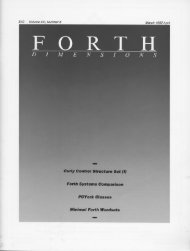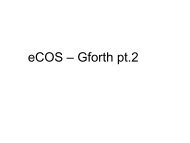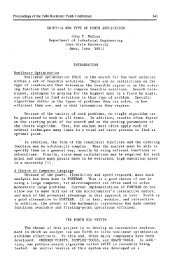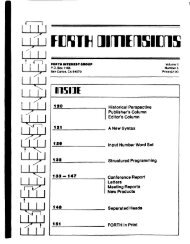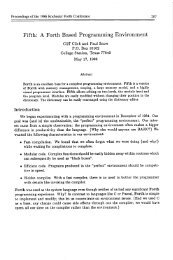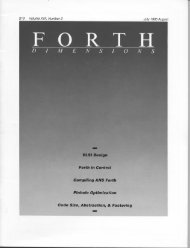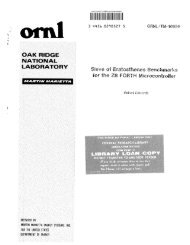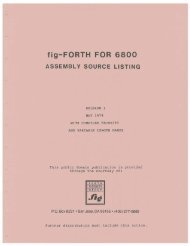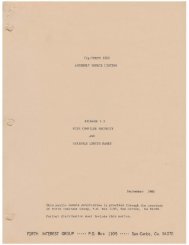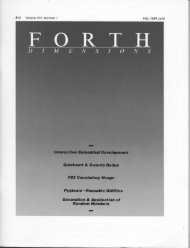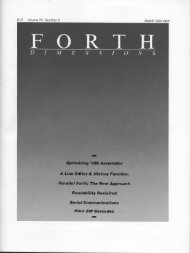5 - Forth Interest Group
5 - Forth Interest Group
5 - Forth Interest Group
Create successful ePaper yourself
Turn your PDF publications into a flip-book with our unique Google optimized e-Paper software.
I News from the <strong>Forth</strong> RoundTable<br />
1 What is this language, <strong>Forth</strong>?<br />
Gary Smith<br />
Little Rock, Arkansas<br />
Yes, there is an ANS <strong>Forth</strong><br />
in the process of being<br />
drafted. Yes, the Technical<br />
Committee has labored long<br />
and hard in its collective at-<br />
tempt to meet the conflicting<br />
demands of minimalist ver-<br />
sus maximalist, desktop user<br />
versusembedded-system<br />
implementor. Yes, many<br />
compromises have been ar-<br />
rived at and many arnbigu-<br />
ities removed from the BA-<br />
SIS as it winds ever closer to<br />
only X3J14<br />
but the<br />
proposal manifest we all look<br />
fonvard to. ISee@ANSFo?th<br />
anMummt page 4J<br />
As was pointed out in my<br />
last columrtviaex*anges<br />
'leaned from GEnie <strong>Forth</strong><br />
RoundTable lo#<br />
Topic 25-several questions<br />
are being debated In<br />
this issue, we examine dis-<br />
cussions in Category 10,<br />
Topic 12, WJ14 Holding<br />
Pattern," to discover that even<br />
the question, "What<br />
is this language, <strong>Forth</strong>?" is<br />
subject to heated discussion<br />
Maybe* when the dust has<br />
settled, we will ciiscover the<br />
ultimate truth that <strong>Forth</strong> is an<br />
attitude and has nothing to<br />
do with standardization.<br />
Read on.. .<br />
Caresor' lo: 'o*<br />
Standards<br />
From: Doug Philips<br />
Re: Architecture and Implementation<br />
John Wavrik writes:<br />
"The ANSI team has a p<br />
parently not only invented<br />
a new language, but also<br />
a new concept in com-<br />
puter science: a language<br />
that manipulates data<br />
structures in a functional<br />
way but does not allow<br />
us to know what the data<br />
structures are. Sure<br />
doesn't soundlike a good<br />
idea, does it? Certainly<br />
isn't a tested idea, is it?'<br />
Oh, come on now, X3J14<br />
didn't do this fust, X3J11 did<br />
it, and they probably weren't<br />
even the first! HOW big is an<br />
integer (cell)? Implements-<br />
tion defmed, mranteed to<br />
be at least n bits. How big is<br />
a long (2cell)? Implementa-<br />
tion defmed, guaranteed to<br />
be at least m bits and m 2 n<br />
1 will that one nee& to<br />
know something about the<br />
six ofthings (not<br />
sothat,say, ' f oobar ! will<br />
work (or not). Do I need to<br />
know anything about what a<br />
' execution-token really is?<br />
No. 1 need to know is the<br />
set of operators that take one<br />
(or more) as arguments and<br />
the set that can produce them.<br />
I believe the term is<br />
"ahtract data type." Can you<br />
do arithmetic on a<br />
tion-token? Yes, but it will<br />
not be portable. As the standard<br />
is concerned with portability,<br />
it will not allow such<br />
action in a conforming program.<br />
"If one is to limit the ex-.,<br />
tensibilityof<strong>Forth</strong>and<br />
rely upon vendor-sup-<br />
plied standard operators,<br />
then a great number of<br />
them must besuppliedin<br />
the hopes of meeting as<br />
many needs as possible.<br />
words like COW ILE, and<br />
START : become ex-<br />
tremely important as an<br />
attempttorescuesomeof<br />
the functionality of classi-<br />
cal <strong>Forth</strong>. Even then, one<br />
typically that the<br />
do not<br />
do exady what<br />
Sounds exactly like the<br />
mp that most conven-<br />
tional languages have<br />
falleninto, doesn'tit?And<br />
<strong>Forth</strong> did have a<br />
solution, didn't it? And<br />
the is propos-<br />
ing a language that ig-<br />
This is very important, I<br />
will agree.<br />
"I mention this word because<br />
it is one in which<br />
deviant implementations<br />
have already appeared.<br />
There have been a host of<br />
messages in this<br />
newsgroup pointing out<br />
that some of my examples<br />
using START : do not<br />
work on other trial irnplementations.<br />
~ 11 I can say<br />
is that I consulted the<br />
author before implementing<br />
mine. Incidentally,<br />
I don't think this will<br />
be unusual-1 think that<br />
as moreimplementations<br />
of the proposed ANSI<br />
<strong>Forth</strong> appear, more deviations<br />
will appear. It is<br />
almost an inevitable consequence<br />
of to<br />
specify operaton while<br />
beingfUzz~aboutwhat<br />
they operate on-"<br />
Funny, I thought that was<br />
just the natural result of us-<br />
ing English. And of the fact<br />
that any group, having con-<br />
centrated on something for<br />
as long as any of the ANSI<br />
Technical Committees [TCs]<br />
do, will come to an under-<br />
standing that is not always<br />
vans*d in the first pass<br />
or two. In fact, ANSI takes<br />
Useful things that can't be<br />
done demonstrate weakness<br />
in the standard...<br />
nores this solution, isn't it?"<br />
Straw argument If<br />
had had *bk and<br />
~t that point, an oficial #re-<br />
wsolutiO*~hered<br />
be no "hard workn to doing<br />
standard' perhaps,<br />
a need to do one at all.)<br />
"Not only is it not easy to<br />
tell, without extensive<br />
testing, whether sufficiently<br />
many operators<br />
have been added--but<br />
there is the very real<br />
problem of making sure<br />
that they have been<br />
'pecified<br />
into account that it may not<br />
get completely clarified until<br />
after the standard is adopted<br />
quest for interpretation" can<br />
be submitted. I'm not totally<br />
up on my procedure here,<br />
but the answer is probably<br />
binding on the standard<br />
(couldsomeone from the TC<br />
spell this out in painstaking<br />
detail for me, please?). Yes, it<br />
would be better if that never<br />
had to be done. Better still is<br />
a plan to handle corrections.<br />
"It's a bit like a car trip: if<br />
a wrong turn was taken<br />
<strong>Forth</strong> Dimensions 19 January 1992 February



